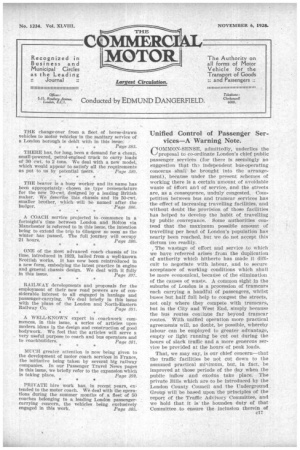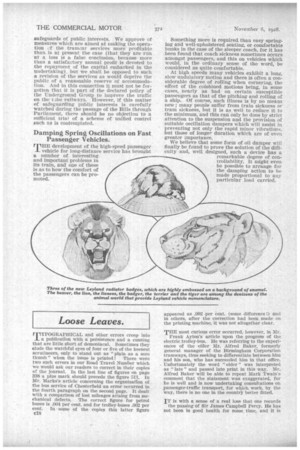Unified Control of Passenger Services—A Warning Note.
Page 1

Page 2

If you've noticed an error in this article please click here to report it so we can fix it.
COMMON-SENSE, admittedly, underlies the proposal to co-ordinate London's chief public passenger services (for there is seemingly no suggestion that tin independent bus-operating concerns shall be brought into the arrangement), because under the present schemes of working there is a certain amount of avoidable waste of effort anq of service, and the streets are, as a consequence, unduly congested. Competition between bus and tramcar services has the effect of increasing travelling facilities, and without doubt The provision of those facilities has helped to develop the habit of travelling by public conveyance. Some authorities contend that the maximum possible amount of travelling per head of London's population has nearly been reached, but we do not accept this dictum too readily.
, The wastage of effort and service to which we have referred arises from the duplication of authority which hitherto has made it difficult to negofrate with labour, and to secure acceptance of working conditions which shall be more economical, because of the elimination of the causes of waste. A common sight in the suburbs of London is a procession Of tramcars each carrying a handful of passengers, whilst buses but half full help to congest the streets, not only where they compete with tramcars, but in the City and West End, simply because the bus routes conzinue far beyond tramcar routes. With unified operation more practical agreements will, no doubt, be possible, whereby labour can be employed to greater advantage, empty or light running be cut out during the hours of slack traffic and a more generous service be provided at the hours of peak loads.
That, we may say, is our chief concern—that the traffic facilities be not cut down to the assumed practical minimum, but, in fact, be improved at those periods of the day when the public inflow and exodus take place. The private Bills which are to be introduced by the London County Council and the Underground. Group will be based upon the principles of the report of the Traffic Advisory Committee, and we hold that it is the bounden duty of that Committee to ensure the inclusion therein of safeguards of public interests. We approve of measures which are aimed at making the operation of the tranwar services more profitable than is at present the case (that they are run at a loss is a false conclusion, because more than a satisfactory annual profit is devoted to the repayment of the capital embarked in the undertaking) , but we shall be opposed to such a revision of the services as would deprive the public of a reasonable reserve of accommodation. And in this connection it must not be forgotten that it is part of the declared policy of the Underground Group to improve the traffic on the tabe railways. However, if this matter of safeguarding public interests is carefully watched during the passage of the Bills through Parliament, there should be no objection to a sufficient trial of a scheme of unified control such as is contemplated.
Damping Spring Oscillations on Fast Passenger Vehicles.
THE development of the high-speed passenger vehicle for long-distance service has brought a number of interesting and important problems in its train, and one of these is as to how the comfort of the passengers can be promoted.
Something more is required, than easy• springing and well-upholstered seating, or comfortable bunks in the case of the sleeper coach, for it has been found that coach sickness sometimes occurs amongst passengers, and this on vehicles which would, in the ordinary sense of the word, be considered as quite comfortable.
At high speeds many vehicles exhibit a long, slow undulatory motion and there is often a considerable degree of rolling when cornering, the effect of the combined motions being, in some cases, nearly as bad on certain susceptible passengers as that of the pitching and roiling of a ship. Of course, such illness is by no means new ; many people suffer from train sickness or tram sickness, but it is as well to reduce it to the minimum, and this can only be done by strict attention to the suspension and the provision of suitable oscillation dampers which will assist in preventing not only the rapid minor vibrations, but those of longer duration which are of even greatar importance.
We believe that some form of oil damper will finally be found to prove the solution of the difficulty and, well designed, such a device has a remarkable degree of controllability. It might even be possible to arrange for the damping action to be made proportional to any particular load carried.






























